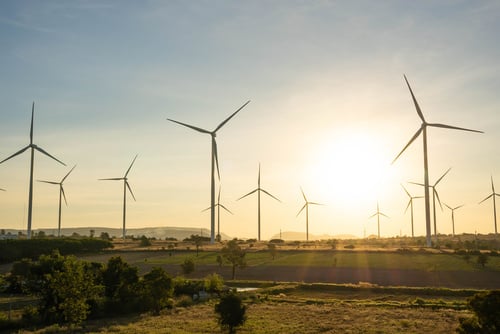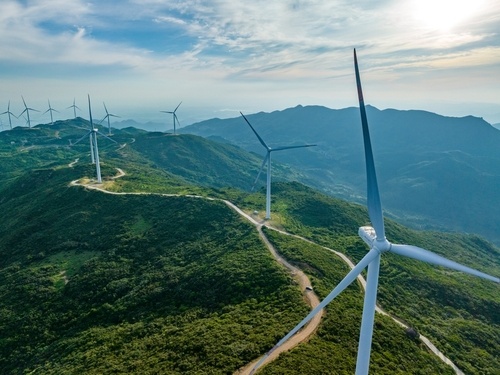Trident's head of sales and marketing, Richard Holdsworth interviewed sustainability engineer and qualified ESOS Lead Assessor Derek Tonge about the proposed changes outlined by the Government in its response and the impact of these changes on Phase 3 of the scheme and beyond.
Read the full video transcript below.
Richard: Welcome Derek and thanks for joining me this morning. I thought it was time to have a catch-up and find out a bit more about ESOS phase 3. We've had the government consultation which was completed in July (2022), and I was wondering if you could share your findings on what that was all about. So maybe you could start by giving us a bit of background on why the government had this consultation.
Derek: We're in Phase 3 of ESOS. ESOS effectively started in 2014, phase one ended in 2015, and phase two from 2015 to 2019 and we’re now in Phase 3. So far, it's been a repeat exercise. In terms of guidance, there have not been many changes over the seven years that we've been working on ESOS. Approximately 12 months ago the government looked at ESOS and asked a number of questions to various parties, looking at ways to improve the quality and the effectiveness of the scheme. They had a consultation and in July the results of the consultation were issued. They talked about how they want to change ESOS moving forwards which will impact both Phase 3 and certainly, as we move into Phase 4 at the end of next year, there will be a lot more changes.
Richard: Before we start talking about the changes that have been recommended from the ESOS consultation, from a legal perspective where do customers stand at the moment?
Derek: As we stand today if you go onto the gov.uk website, the ESOS guidance is dated 1st February 2021. The consultation that's been published provides detail about a number of changes that they want to implement within Phase 3 and also talks more heavily about Phase 4 and how ESOS will develop into Phase 4. With Phase 3 the actions that they want to implement still have to go through Parliament and gain parliamentary approval. As it stands today the guidance is from last year, but the likelihood is that there are a number of changes that will be implemented within Phase 3.
Richard: I guess given the Parliamentary schedule and everything else that's going on in the world right now, is there a risk that this might not even get through Parliament?
Derek: I wouldn't like to comment on that, but we've only got 14 months left of Phase 3 and as you alluded to, there's a lot going on within the government at the moment.
Richard: Our advice to companies out there at the moment is really that the parliamentary schedule is out of our control.
Derek: Most definitely.
Richard: So approach ESOS Phase 3 as though the recommendations have now been enacted, to cover yourself really - that's the safe option.
Derek: Yes, absolutely. Our advice for a number of months, even a couple of years now, is to act on Phase 3. The changes that will likely be implemented we can react to but getting the work done is the most important thing because we have what is now becoming an increasingly tight schedule to complete the work.
Richard: Perhaps you can share with me then what are some of the changes that have been recommended that are different from Phase 1 and Phase 2?
Derek: Some of them are fairly simple. They talk about issuing a standardised template. At the moment, there is guidance in terms of the reporting mechanism for ESOS but the government on this part of the consultation is talking about issuing a standardised template. Whoever has to comply with ESOS, the report that's issued will be done to a standard format so it includes all the information that the government wants it to include.
Richard: Has that required any additional learning for Lead Assessors?
Derek: As it stands at the moment, the way we prepare the report, there is basically no change for us. We've included a lot of the items that they talk about historically, but we don't have the finite detail of it, and we don't have access to the proposed template yet. However, we feel that the work that we do at Trident certainly covers the main parts that they talk about.
Richard: I'm guessing over the last couple of phases, the government has found that there have been degrees of variation in terms of what's been reported and the quality of those reports.
Derek: Absolutely - I think most consultations that work with ESOS have improved their delivery and as we move forward we've improved the quality of templates.
Richard: What are the other key recommendations coming out of the consultation?
Derek: Historically, ESOS has had a 10% de minimis, and part of the consultation, and the recommendations for Phase 3, is reducing that de minimis to 5%. This is essentially the percentage of energy that you can exclude from the review and survey process.
Richard: Am I right in thinking companies have always had to report on 100%?
Derek: Yes
Richard: So dropping it to 5% might just mean that they need to do more detailed survey work.
Derek: It could bring fuel in for example. Transport is sometimes an obvious one (but not always). Reducing the de minimis from 10 to 5% will likely bring in an additional fuel within the survey process that could have been excluded when it was 10%. For example, if gas accounted for 9% of the total energy consumption it could have been excluded from the audit process previously. With de minimis falling to 5% this would now have to be included within the audit process and surveys.
Richard: I am guessing additional time is taken which will mean a little bit of increased cost potentially for some customers compared to what they did in Phase 2.
Derek: Absolutely - it is something that customers need to be aware of. Another notable point from the consultation relating to Phase 3 of ESOS is the introduction of an energy intensity metric.
Richard: So similar to how companies will be used to reporting on their Streamlined Energy and Carbon Reporting (SECR)?
Derek: Yes. The consultation gives three examples - the kilowatt hours per meter squared for buildings, kilowatt hours per unit of output for production activities and kilowatt hours per mile for transport.
Richard: Do companies have to choose one of those three or is there some flexibility? Can they select another one?
Derek: This is unclear at the moment. Those are the three examples that they talk about within the consultation. They've not said whether you can actually introduce your own energy intensity metric for example turnover and FTE are a typical metric that we use for SECR reporting.
Richard: Yeah – okay.
Derek: One of the failings of the project has been where consultants identified opportunities for saving energy as per the definition of the project but there is no rule for companies to implement these actions. Logic says if the good true actions fall within the specified payback period you will implement them because it's a direct cost saving. Part of the consultation talks about companies producing action plans. You will have a set of recommendations from the surveys and reports, and it's actually putting the program in place to implement those actions or address why you have chosen not to.
Richard: This is symptomatic of the government's overall drive to Net Zero, we’ve seen this with other pieces of legislation such as PPN 06/21. The companies now have to have a credible carbon reduction plan if they want to bid for larger government contracts and there seems to be some alignment coming on here from various government initiatives.
Derek: The government has got a Net Zero target and ultimately the work from ESOS and other projects need to be implemented to ensure that the government hits that target. It's everybody's responsibility, therefore it's putting more ownness on the organisations to consider those recommendations. Some recommendations won't always be implemented but justifying and understanding why they've not been implemented is needed. It's really trying to push forward that Net Zero journey.
Richard: From a compliance perspective, what do customers need to make sure is in their report that is different from phases one and two?
Derek: For phase three it's difficult to comment at the moment but at Trident we haven't just focused on the energy savings, we also include if we identify opportunities for reducing carbon, we tend to include those in the reports as well. There are instances when potentially there is an energy increase, for example, an increase when changing fuel types. You might have a much lower carbon emissions factor, but you have to put more of that fuel into the equipment. We've always looked at carbon opportunities as well and certainly, our focus moving forwards will really be encompassing all aspects of carbon reduction
Richard: For phase one and phase two certainly many of the customers we've spoken to viewed ESOS as just ticking a compliance box. ESOS phase three however we're seeing a notable change in customer responses to it. I think that the cost of electricity obviously has shone a light. For us, ESOS sits in the middle of the three Cs of energy, its compliance, its cost reduction and obviously carbon reduction. How are we approaching phase three beyond compliance, what else are we looking to incorporate in our surveys and reports?
Derek: We already identify carbon opportunities in our reports, even though some might not be related to energy, we try and report on all carbon opportunities we identify. ESOS currently is primarily looking at scope one and scope two, but I think as we move forwards into phase four, we'll be looking at potential opportunities for scope three emissions reductions as well.
Richard: What are some examples of things that you have found or that you have identified on surveys that relate to carbon and not necessarily energy saving?
Derek: The obvious one is looking at different fuel types. Without going into specific details, quite often with lower carbon fuels there's potential they have a lower calorific value and therefore you're potentially consuming more energy, but the result of carbon emissions is much lower, particularly around diesel. Meaning there can be a negative energy increase but a significant reduction in the associated carbon emissions. Whilst that goes against the initial ethos of ESOS, we feel it's important to put it into the report because it provides the full picture for an organisation that is looking at that energy reduction but also that carbon reduction Journey which is becoming more of a focus.
Richard: In recent months because of the price of electricity we have had a lot of customer enquiries about technology like solar PV. Payback periods used to be eight to ten years perhaps a year or two ago and now they're down to maybe four or five years. How would we be approaching a project like that in relation to ESOS? Where does that sit?
Derek: Solar PV is typically an opportunity that we review on any site that we visit. The focus on PV was much more of a forward-thinking technology with the cost of electricity increasing and particularly for the companies thinking about their Net Zero Journey. The opportunities for PV are increasing, we’ve always tried to incorporate PV recommendations where appropriate but there is a lot more interest now.
Richard: Is it a requirement of ESOS phase 3 to report on those things or is this more our response to customer demand wanting to look at these things?
Derek: We always think beyond the guidance. If you look at the original ESOS guidance there was no focus on on-site generation, for example. Where applicable, we've incorporated on-site generation opportunities because it's part of that Net Zero Journey that organisations need to be taking.
Richard: What advice have you got for companies when selecting a lead assessor? What should they be looking for?
Derek: The work has to be overseen by an accredited ESOS lead assessor. Some of the site survey work doesn't have to be done by an ESOS lead assessor, however, at Trident all our engineers are qualified ESOS lead assessors. It's important that you select a lead assessor and an organisation that has experience within your industrial sector or your commercial sector, which we at Trident do. It's important to understand how the work will be conducted beyond that lead assessor. It's understanding who will be completing that work and at what level and do they have the right experience. It will be the ESOS lead assessor that oversees and polices that work making sure you’re compliant so it's really getting into the detail of who's doing what within that process
Richard: Look for not just a lead assessor but a lead assessor that has got the support of a whole team of individuals that have got the knowledge and experience.
Derek: The support, the experience, the knowledge, the track record. Another thing that the consultation talks about is going into Phase 4 the quality and the experience of ESOS lead assessors are going to be reviewed and potentially, they are even talking about industry-specific experience with lead assessors. I think it's important for Phase 3 but certainly, as we move forward beyond Phase 3.
Richard: Might that mean lead assessors need re-certifying in some way?
Derek: The implication is I think they will be reviewing the ESOS leadership accreditation process. Experience is always key, make sure your ESOS lead assessor has experience in your sector.
Richard: With that in mind that sounds like in Phase 4, there may be even more scarcity of qualified lead assessors. We have known it's been a problem in Phase 1 and Phase 2. People don't have to actually submit their final report until December 23.
Derek: Correct.
Richard: The qualification date doesn't really start until December this year
Derek: The 31st of December 2022.
Richard: We have touched on scarcity in Phase 4, in Phase 1 and Phase 2 there was a scarcity of lead assessors. Is taking action now in September too early, what's your opinion?
Derek: The forward-thinking customers have already engaged. We have already completed site surveys for some of our customers. They're benefiting from the information, from the site surveys and the energy-saving opportunities. They are already benefiting from those opportunities and making reductions. Particularly with the cost increases that we are seeing at the moment, they're already benefiting from it. In many instances, it will cover the cost of the work that's been carried out.
Richard: A year to go until the compliance date, why should companies be acting now rather than next year?
Derek: The forward-thinking companies are not just acting now they've acted one, two, two and a half years ago. We have been carrying out ESOS surveys and we've actually completed site surveys for a number of organisations. In terms of the compliance journey, they're well on the way and the benefit that they've got is they've had access to site reports so they've been able to see where they have real energy savings opportunities and been able to implement them.
Richard: Absolutely, the cheapest kilowatt hour you can buy is the one you don't use. If they're able to reduce that right now then they've been the big winners over the last few months
Derek: Yes and we have surveys planned throughout the next 12-14 months. The resource will become an issue as we move forward, which we have seen in Phase 1 and Phase 2. The availability of ESOS lead assessors and people capable of delivering a quality site survey or survey on transport will diminish. It's important that you engage early. Work has to be planned. Site surveys can be time-consuming and put into the diary to make sure all relevant people are available. Then writing the reports plus compiling the ESOS compliance work. It is critical that you engage as soon as possible we can't wait till the Phase 3 consultation has gone through Parliament - we have to pre-empt what the likely changes are.
Richard: There won't be enough time for everybody to get their surveys done if we wait that long.
Derek: If you do leave it, that availability of people to carry out the work diminishes, and you just get closer to the deadline and the risk of non-compliance and the potential financial implications of non-compliance.
Richard: Scarcity increases the value of something so less supply of lead assessors if demand remains high.
Derek: It’s the supply of quality personnel to deliver and we've seen that historically.
Richard: Looking ahead to Phase 4, have we seen anything in the consultation that companies need to consider?
Derek: The consultation does talk about Phase 4 in the future. Different segments address Phase 3, some of it moving forwards into Phase 4 and I think we'll see a step change as we move forward into Phase 4. There's a lot more emphasis on aligning ESOS with Net Zero aspirations and the government’s aspirations for the country and I think we'll see a greater shift. Phase 4 there will be a radical change from Phase 3 in terms of the work that's carried out and how it's carried out and the results from that.
Richard: It makes sense I think with the recent increases in energy prices, the carbon conversation has taken a bit of a back seat over the last few months as people have been dealing with the energy crisis but it's temporary and it will be back on the agenda.
Derek: You think about the intentions of ESOS, it's about saving energy then the result is saving carbon emissions. It is an incredibly useful tool and it's very cost-effective for a lot of organisations but really enhancing the scheme and modernising it, moving forwards on that Net Zero journey.
Richard: 14 months to go until the compliance date, why should companies act now?
Derek: The forward-thinking companies acted two and a half years ago. On the back of covid restrictions, we've been carrying out energy surveys as part of ESOS Phase 3 for the last couple of years. We have completed a lot of surveys. So in terms of that compliance journey, we're well on the way to completing Phase 3 work. Obviously we've got the final year total energy consumption and registration to complete, and those companies are now benefiting from the opportunities that we've already identified, which is particularly important with the recent energy cost increases.
Richard: If they've implemented those projects they're the big winners right now.
Derek: The sooner you get the site reports and surveys done, then the sooner you can identify and implement measures to mitigate cost increases by reducing your energy consumption and then reducing carbon emissions in the long term.
Richard: All makes perfect sense to me Derek. I guess if you were to summarise everything we've talked about today, what are the key points that customers should be taking away from our chat?
Derek: I think ESOS is a very valid scheme. It's there to reduce energy consumption and carbon emissions, resulting in direct cost reduction. The consultation is looking at modernising the ESOS scheme from what has, in many people's eyes, become more of a compliance objective towards a net zero journey. We’ll see a transformation of ESOS moving forwards but ultimately, its beneficial to many organisations, and some have benefited significantly from a cost, energy and carbon reduction perspective. It is simply modernising this and bringing it into the 21st century.
Richard: So our advice is to act now - don't wait until the consultation has gone through Parliament because there'll be a scarcity of lead assessors. Be careful choosing your lead assessor – pick somebody who's got good experience in your sector with good support from a company that can deliver the project to a good quality and on time. Ultimately a good quality ESOS report will identify cost savings, and carbon savings, as well as ticking the compliance box.
Derek: Yes and we treat this very much as a stepping stone into that carbon reduction journey moving forwards so the work that we now do helps on that journey.
Richard: Well thanks Derek. It's been great catching up today, really informative. I really enjoyed it thank you
Derek: Yes and as we find out more information about the consultation, particularly as it starts to go through Parliament or goes through Parliament, we can catch up again and review the findings of that.
Richard: Super - looking forward to it.






